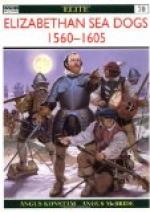CHAPTER VI
DRAKE’S BEGINNING
We must now turn back for a moment to 1545, the year in which the Old World, after the discovery of the mines of Potosi, first awoke to the illimitable riches of the New; the year in which King Henry assembled his epoch-making fleet; the year, too, in which the British National Anthem was, so to say, born at sea, when the parole throughout the waiting fleet was God save the King! and the answering countersign was Long to reign over us!
In the same year, at Crowndale by Tavistock in Devon, was born Francis Drake, greatest of sea-dogs and first of modern admirals. His father, Edmund Drake, was a skipper in modest circumstances. But from time immemorial there had been Drakes all round the countryside of Tavistock and the family name stood high. Francis was called after his godfather, Francis Russell, son and heir of Henry’s right-hand reforming peer, Lord Russell, progenitor of the Dukes of Bedford down to the present day.
Though fortune thus seemed to smile upon Drake’s cradle, his boyhood proved to be a very stormy one indeed. He was not yet five when the Protestant zeal of the Lord Protector Somerset stirred the Roman Catholics of the West Country into an insurrection that swept the anti-Papal minority before it like flotsam before a flood. Drake’s father was a zealous Protestant, a ‘hot gospeller,’ much given to preaching; and when he was cast up by the storm on what is now Drake’s Island, just off Plymouth, he was glad to take passage for Kent. His friends at court then made him a sort of naval chaplain to the men who took care of His Majesty’s ships laid up in Gillingham Reach on the River Medway, just below where Chatham Dockyard stands to-day. Here, in a vessel too old for service, most of Drake’s eleven brothers were born to a life as nearly amphibious as the life of any boy could be. The tide runs in with a rush from the sea at Sheerness, only ten miles away; and so, among the creeks and marshes, points and bends, through tortuous channels and hurrying waters lashed by the keen east wind of England, Drake reveled in the kind of playground that a sea-dog’s son should have.
During the reign of Mary (1553-58) ‘hot gospellers’ like Drake’s father were of course turned out of the Service. And so young Francis had to be apprenticed to ’the master of a bark, which he used to coast along the shore, and sometimes to carry merchandise into Zeeland and France.’ It was hard work and a rough life for the little lad of ten. But Drake stuck to it, and ’so pleased the old man by his industry that, being a bachelor, at his death he bequeathed his bark unto him by will and testament.’ Moreover, after Elizabeth’s accession, Drake’s father came into his own. He took orders in the Church of England, and in 1561, when Francis was sixteen, became vicar of Upchurch on the Medway, the same river on which his boys had learned to live amphibious lives.




